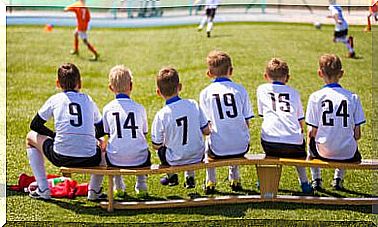Keys To Accompany The Children On Their Way To School

The move to high school is one of the most important milestones and one of the most drastic changes in the life of a minor. Some of the young people will change schools and others will remain there; but, undoubtedly, all will have to face challenges and challenges. New classrooms, new teachers, greater academic demands… All these developments add to the already complicated adolescence.
From home there are certain guidelines that we can follow to facilitate this transition for our children. And many of them consist of anticipating possible difficulties and reinforcing the personal resources of minors to face them. Thus, with a little attention and joint effort, we will make this experience exciting instead of threatening.
How to accompany the children in the passage to the institute?

Positive attitude
The attitude with which the passage to the institute is faced can be decisive, since we already know that beliefs are often transformed into self-fulfilling prophecies. Thus, if the young person comes feeling fearful and unprepared, expecting the worst and perceiving the change as negative, their experience will be much more unpleasant.
Therefore, it is important that parents express themselves about this transition in a positive way. That they approach it as an acceptable and exciting challenge. They must transmit to the young person the idea that a stage is opening before him for which he is prepared and that will bring him wonderful experiences. In this way, he himself will develop a more open disposition to change.
Identify the main fears
As in any other stage of development, knowing the main associated fears is helpful. Around twelve years of age, minors begin to experience so-called social fears. These are related to the need to fit in and be accepted by the peer group. Thus, your child is likely to be afraid of not being able to cope with academic demands, not being able to make friends or being rejected by others.
Have an open and honest conversation with him and allow him to express his fears. Putting them into words will greatly reduce the negative emotional charge. And, in addition, it will offer you an idea of those areas that need to be worked on.
Know the terrain
Something that can be very beneficial is allowing the adolescent to familiarize himself with what his new routine will be from now on. Visiting the centre’s facilities, browsing their website or talking to some teachers can help the young person feel more comfortable.
In the same way, making the way from home to the institute before the start of classes and contacting other young people who will be your classmates can help you increase your confidence in the face of change.
Acquire and develop tools
Finally, if any of the previously detected fears generates significant discomfort in the child, it will be necessary to address it appropriately. Working on social skills, self-esteem, and anxiety management are necessary tasks that can prevent future problems.
In the same way, perfectionism, intolerance to frustration or bad study habits can lead to difficulties after the transition to high school, so it is advisable to prevent.
The child must go to school feeling confident and self-assured, being able to manage their emotions and social relationships. No one knows your child better than you, so if you perceive that he is lacking in some of these areas, you should consider seeking professional help to help him reinforce them.

The move to high school is a transition
It is completely natural for a young person to feel a certain fear of going to high school, and this will be much greater the more changes they have to face. Therefore, as parents, we must emphasize that the initial nerves, uncertainty and discomfort are temporary. It is okay if the first few days you do not make friends, do not understand well how the subjects work, or do not find your class. Over time, everything will settle down.
We must remind them that they are capable, intelligent and courageous, and that they have everything they need to take on this stage of their life successfully. Good preparation can help make the transition more bearable, so do not hesitate to spend some time preparing and accompanying your child to go through it.










